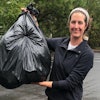
“TED was pretty good for the 20th century. I think there’s time now to think of some other forms. It’s not a matter of criticizing. Horses were good for the 19th century. Horses are still good. I’m not trying to say there’s a best way. I don’t believe there’s a best way.”
Those are the words of Richard Saul Wurman, the architect, designer, and author who founded TED in 1984—and in doing so challenged every existing assumption about conference design. (He no longer owns or runs TED.) Now the 77-year-old Wurman is at it again, not trying to create the “best” way of bringing people together, but focused on exploring a new way. He is preparing to host the WWW Conference September 18-20 in a 300-seat auditorium on the campus of Esri, a Redlands, California-based software company owned by a close friend. As we’ve come to expect from Wurman, this conference will be unique, particularly in format and follow-up.
And then there's the name, which has nothing to do with the World Wide Web. The event’s Web site says the first “W” does stand for world, but the other two represent any number of “w” words (weather, women, war, well-being, wizardry, and the list goes on). Wurman explains it this way: “I was just trying to be clever. It's a good name for a conference that is memorable. I like naming things.”
The format will be simple: a series of spontaneous conversations on the auditorium's stage among two or three of Wurman’s invited participants, prompted by a question or topic that he will provide. The conference Web site lists some of the 66 participants, a diverse group that includes cellist Yo-Yo Ma, architect Frank Gehry, businessman and Dallas Mavericks owner Mark Cuban, and The Simpsons creator Matt Groening. “These are my friends,” he says. "I have a very good Rolodex."
In a recent conversation with Wurman, he shared details of this conference, his future projects, and why he likes to do most of the work himself.
Tell us more about the format for the WWW Conference.
It’s only conversations. And the participants don’t show a book and they don’t talk about their work. I will suggest to them a postulation. It might be, discuss the difference between personalization and generalization. It will have nothing to do with anybody’s work. I’m creating the pairings and the postulations. It’s my dinner party. I think it’s a nifty idea if it works. I probably won’t tell them [the topics] ahead of time. It will be improvised. It will be terrifying.
There will be no A.V. whatsoever. During the breaks there will be a room where we’ll have telepresence, and we’ll connect with amazing people around the world. Let’s say the guy who designed the opening and closing of the Beijing Olympics. During a break we can go into a room and we talk to him live. There will be four breaks and four different people around the world you can talk to for half an hour. Isn’t that fun?
Why does this format appeal to you?
What is a more indulgent thing that any human being can do than what I am doing. I can have the people I love to talk to, come and talk. What a blessing. I get Yo-Yo Ma to come and E.O. Wilson to come and Frank Gehry to come, and we sit around a talk. Why wouldn’t you do that if you could? The only difference between me and somebody else is I can do it. That took my whole lifetime to design a life where you can do this.
So in addition to the 66 participants, who can each bring a guest, you are selling about 80 seats for $16,000 each.
And I'm throwing in the hotel and all the food. If somebody gives me $16,000, they are in. There’s no interview and it’s not selection. If somebody comes up with that, it’s a self-fulfilling prophecy. I’ve sold about 10 seats just through word of mouth. And I will live-stream it to some corporations who want to sponsor it for their top clients.
After the event, you intend to offer an app that provides videos of each of the conversations and additional content. What is that content?
That’s the new modality. It will be photographed by an Academy Award-winning photographer and will be translated into 12 languages. It will be a curated mish-mash of stuff. If you double click on the person’s name of the two people talking, you will have a highly curated backstage view of that person. It will be things about each participant that you wouldn’t ordinarily find, more custom than Google citations or a TED talk. Someone who deals in three dimensions is different than a scientist is different than a poet that deals in words. And what you want to find out about these people is different.
If I was meeting Frank [Gehry], I would like to see Frank’s office and I would like to see what didn’t he do. What are his favorite things? Wouldn’t you like to ask those questions? This is allowing you to assuage your curiosity. Which is all what my life is about—assuaging my curiosity. It’s really quite simple. Nobody asks me to do anything. I just do what I feel like doing.
You are creating and running all of this out of your home in Newport, Rhode Island?
That’s why I have time on my hands—my gates are closed and I’m a recluse. I have no staff. I have an assistant that books my travel and takes my phone calls. I have some friends helping me but they are unpaid. They don’t work for me. It’s very collegial, what I do. I was just out at the [conference] hotel meeting with the chef. I do the menu and I order nothing off the hotel menu. It’s all extremely healthy, good food. I’m involved in the transportation. It’s easier to do it than hand it off and have someone spend a lot of time, a lot of your money, and come back to you with five ways of doing it and you end up choosing the way you wanted in the beginning. That’s not cost effective, or time effective. If something’s going to fail I might as well take the hit and fail. That’s the way I ran TED. I had maximum one or two people.
And the WWW Conference is just one of several events you are working on. Next year you plan to produce Prophesy2025. Tell us about that.
Prophesy is a completely different invention, which takes place around the world. It’s a five-week conference, but only on Mondays. It’s the opposite of this one [WWW]. It will be presentations, with a lot of A.V. Single speakers for an hour each, but only five of them in the one day of the conference. Every Monday for five weeks. Beijing, Delhi, Tel Aviv, Berlin, Chicago, whatever five cities I pick. I chose Monday because I can. That means I can travel over the weekend to get someplace.
What motivates you to keep inventing new forms of gatherings?
I feel everyone is very lazy glomming on to just what I invented before. So every conference now looks like TED. I guess it’s a form of flattery, but it’s not interesting to me in that way anymore. I don’t believe in just doing better versions of what you’ve done before. I’m trying to invent other things. I’m testing the waters. It’s not a matter of criticizing. We live in a world of also. TED goes on and also maybe this will go on. Maybe going to conventions and playing golf will go on. Maybe going to a Renaissance weekend will also go on. We also do this and we also do that. TED was pretty good for the 20th century. I think there’s time now to think of some other forms. It’s not a matter of criticizing. Horses were good for the 19th century. Horses are still good. I’m not trying to say there’s a best way. I don’t believe there’s a best way. I’m just trying to do good work, trying to do something I would like.



















